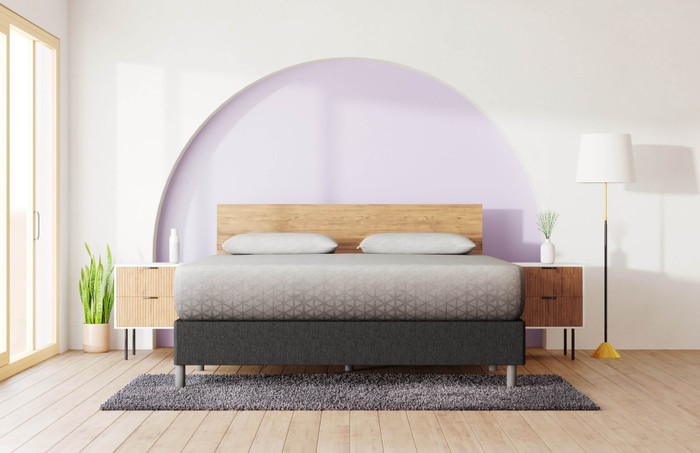What to Do if You Can’t Sleep in Your New Apartment?

November 4th, 2025 . 11 mins read
Key Takeaways
- Adjust to your new environment: Manage unfamiliar light and noise with blackout curtains, white noise, and a cool room (around 65–68°F) to help your body relax and sleep soundly.
- Establish comfort and routine: Keep a consistent bedtime schedule, create relaxing wind-down rituals, and make your bedroom feel familiar with scents, décor, and cozy bedding.
- Prioritize your sleep setup: Unpack and organize your bedroom first, and ensure your mattress and pillows provide proper support—key to feeling settled and sleeping well in your new home.
Moving into a new apartment often feels like the start of an exciting chapter—you get to enjoy a fresh environment, arrange your furniture the way you like, and add personal touches that make the space uniquely yours.
Yet, amid all the excitement, many people face an unexpected challenge: struggling to get quality rest in their new home.
If you’re wondering how to sleep better in a new apartment, you’re not alone.
The mix of unfamiliar surroundings, new noises, and the stress of relocation can easily leave you tossing and turning at night.
The good news is that with a few mindful adjustments, you can ease the transition and create the restful sleep environment you need to truly feel at home.
| Best Luxury Mattress for Restful Comfort Anywhere: | Zoma Mattress |
| Best Hybrid Mattress for Easy Sleep Adjustment: | Zoma Hybrid |
What to Do if You Can’t Sleep in Your New Apartment?
1. Create a Sleep-Friendly Environment
The first step to improving sleep in a new apartment is shaping your bedroom into a truly restful space. New homes often come with noises you’re not used to—neighbors walking above you, traffic outside, or appliances in different positions than before.
These small sounds can be surprisingly disruptive at night. To counter this, try using earplugs, a white noise machine, or even a simple fan to mask unfamiliar noises and create a consistent soundscape.
Light exposure is another major factor; streetlights or hallway lights that filter through thin curtains can suppress melatonin, the hormone that signals your body it’s time to sleep.
Investing in blackout curtains or using an eye mask helps block excess light so your brain gets the signal to rest. Lastly, pay attention to your bedroom temperature.
Studies show that the body falls asleep faster and stays asleep longer in cooler environments, ideally between 18–20°C (65–68°F). Adjusting the thermostat or using breathable bedding can make a noticeable difference in how quickly you settle into deep sleep.
2. Stick to a Consistent Routine
When you move into a new space, it’s easy to let your sleep schedule slide as you unpack late into the night or stay up scrolling through your phone. However, your body relies heavily on routine to regulate its circadian rhythm, the internal clock that tells you when to feel alert or drowsy.
Going to bed and waking up at the same time each day—even on weekends—helps train your body to fall asleep more naturally. In addition, cutting down on screen time at least an hour before bed can prevent blue light from interfering with melatonin production, making it easier to feel sleepy.
Instead of watching TV or scrolling, consider winding down with a book, practicing meditation, or doing some light stretches. These small habits create strong sleep cues for your brain, helping you transition from the stress of moving into the calmness needed for rest.
3. Make Your Bedroom Feel Like Home
A new apartment can feel temporary or unfamiliar at first, and that sense of detachment can make it harder to relax. To bridge that gap, focus on adding elements that bring comfort and familiarity to your bedroom.
Scents are particularly powerful in triggering relaxation, so using lavender candles, essential oils, or even your favorite room spray can help your mind associate the space with calmness.
Personal touches like photos, artwork, or cozy décor also make the room feel warm and inviting instead of bare and impersonal. Soft bedding and pillows tailored to your comfort preference can further enhance the sense of security.
By making your bedroom feel like “your” space rather than just a new set of walls, you encourage your brain to let its guard down, making it much easier to drift off to sleep each night.
4. Check Your Mattress Setup
Finally, never underestimate the role your mattress plays in sleep quality. If you moved with an old mattress, it might not only feel uncomfortable but could also be nearing the end of its functional lifespan—typically around 7 to 10 years.
A sagging or overly firm mattress can leave your body tense, making it harder to relax into deep sleep.
Additionally, your new apartment may come with different room conditions, such as hardwood floors or higher ceilings, which can amplify the sense of discomfort from an inadequate mattress.
Upgrading to one that better supports your body type and sleeping style can dramatically improve rest. Pair it with quality bedding—like breathable sheets and supportive pillows—and you’ll create a strong foundation for restorative sleep.
In fact, investing in a mattress that aligns with your needs may be the single most impactful step toward overcoming sleepless nights in your new home.
5. Unpack and Declutter the Bedroom First
A cluttered or half-unpacked bedroom often creates a sense of chaos that translates into restlessness. Your brain perceives mess as unfinished work, making it difficult to fully relax when surrounded by moving boxes and scattered belongings.
Prioritizing your bedroom during the unpacking process can help create a calm and organized sleep space early on. Start with essentials like setting up your bed frame, arranging your bedding, and clearing pathways around the room.
Once your sleeping area feels clean and complete, your mind naturally shifts into a more peaceful state, signaling that it’s time to rest.
Even if the rest of the apartment still feels in progress, having a dedicated bedroom sanctuary can make a big difference in how quickly you adjust and begin sleeping well in your new home.
6. Manage Stress with Wind-Down Rituals
The moving process often leaves your mind racing with tasks, lists, and adjustments, which can make winding down at night particularly hard. Establishing a bedtime ritual signals to your body that it’s time to transition from “go mode” into “rest mode.”
This could include simple activities like taking a warm shower, journaling your thoughts, or practicing deep breathing exercises. Engaging in mindfulness or meditation before bed has been shown to lower cortisol levels, making it easier to relax.
Even five to ten minutes of stretching or listening to calming music can release tension built up throughout the day.
By making these rituals a consistent part of your nightly routine, you train both your body and mind to associate them with sleep readiness, which is especially helpful when adapting to a new apartment.
Why It’s Hard to Sleep in a New Apartment?
Unfamiliar Environment
One of the biggest reasons people struggle to sleep in a new apartment is the sudden change in surroundings. Our brains are naturally wired to stay alert in unfamiliar places because it’s a survival instinct carried over from ancient times.
When you move into a new home, everything feels different—whether it’s the layout of the bedroom, the direction the windows face, or even the smell of fresh paint and new furniture.
These subtle changes can prevent your mind from fully relaxing, leaving you tossing and turning instead of drifting into deep sleep. The body often takes time to adjust to new cues of safety and comfort, so those first nights can feel unusually restless.
Over time, as you become familiar with your environment, the brain begins to recognize it as safe, but the initial adjustment period is a very common cause of poor sleep.
Stress and Excitement
Another major factor that affects sleep during a move is the emotional rollercoaster that comes with it. Moving to a new apartment is often stressful because it involves endless tasks—packing, unpacking, setting up utilities, and adjusting to new surroundings.
At the same time, it can also bring excitement, especially if it’s a fresh start or a long-awaited upgrade. However, both stress and excitement can trigger the release of cortisol, the body’s primary stress hormone.
Elevated cortisol levels make it difficult to wind down at night, leaving your body in a state of alertness when it should be preparing for rest.
This is why even after physically exhausting moving days, you might find yourself lying awake, replaying tasks in your head or imagining how you’ll set up your new space. The emotional highs and lows of moving can disrupt your natural sleep cycle until your routine stabilizes.
Light and Noise Levels
Sleep quality is highly sensitive to environmental factors like light and noise, and a new apartment often comes with changes in both. For instance, if your old bedroom was quiet and dark but your new one faces a busy street, the headlights of passing cars and the sounds of traffic can make it harder to fall and stay asleep.
Thin apartment walls or upstairs neighbors with different schedules may also contribute to nighttime disruptions. These changes interfere with your circadian rhythm, the body’s internal clock that relies on darkness and silence to signal when it’s time to rest.
Even small disturbances like a flickering streetlight outside your window or a humming refrigerator in a different position than you’re used to can have a surprising impact.
Without proper adjustments—such as blackout curtains or noise-reducing solutions—light and sound levels in a new apartment can significantly delay your ability to achieve restorative sleep.
Poor Bedding Setup
Finally, the setup of your sleep space itself plays a crucial role. During the chaos of moving, it’s common for people to temporarily sleep on old, worn-out mattresses or to neglect arranging their bedding properly.
An uncomfortable mattress, flat pillows, or a lack of cozy layers can send signals of discomfort to your body, preventing it from relaxing fully. The bedroom should ideally be a place of comfort and support, but if your bed doesn’t provide that, your muscles may remain tense, and your sleep will feel fragmented.
In fact, research shows that a supportive mattress and well-arranged bedding contribute to deeper, more restorative rest.
Unfortunately, when moving, many people prioritize unpacking boxes or setting up furniture before focusing on the bed, which delays the creation of a truly restful space. Taking the time to set up comfortable bedding from the start can make a big difference in how quickly you adapt to your new home.
Best Mattresses for a New Apartment
Memory Foam Mattress
A memory foam mattress is often the top choice for people who want contouring comfort and strong motion isolation, especially in apartment living, where you might share the bed with a partner.
This mattress works by responding to your body’s heat and weight, molding around your natural curves to reduce pressure points in areas like the shoulders, hips, and back.
As a result, it creates a feeling of being cradled, which is ideal for sleepers who struggle with joint or muscle pain. Another advantage is its ability to absorb movement.
If your partner shifts or gets up during the night, memory foam minimizes the ripple effect, allowing you to stay asleep undisturbed.
This feature is particularly valuable in apartments where external noises or thin walls can already be disruptive—at least you won’t have to worry about disruptions from within the bed itself.
While memory foam may retain some heat, modern versions often include cooling gel layers or breathable foams, making them a practical and cozy option for city living.
Hybrid Mattress
If you’re looking for the best of both worlds, a hybrid mattress is an excellent choice. It combines the responsive support of innerspring coils with the plush comfort of foam layers, giving you a balance between firmness and softness.
This makes hybrid mattresses a versatile option for all kinds of sleepers, whether you prefer to sink slightly into your bed or rest on a more supportive surface.
The coil system also allows for better airflow compared to all-foam designs, which helps regulate body temperature throughout the night—an important factor in apartments that may run warmer or have less ventilation.
Additionally, the slight bounce of a hybrid mattress makes it easier to change positions, which is particularly useful if you’re a combination sleeper. Hybrids also tend to be highly durable, giving you long-term value for your investment.
For new apartments where space and comfort both matter, this type of mattress provides the reliability of traditional springs with the comfort innovations of modern foam.
Mattress-in-a-Box (Convenient for Apartments)
For anyone moving into a new apartment, a mattress-in-a-box can be one of the most practical choices.
These mattresses are delivered compressed and rolled inside a compact box, which makes them incredibly easy to move through narrow hallways, elevators, or staircases that often pose a challenge in apartment living.
Once unboxed, they expand to their full size within hours, giving you a ready-to-use sleep surface without the hassle of traditional mattress delivery.
Beyond the convenience factor, many mattress-in-a-box options come in memory foam, hybrid, or even latex varieties, so you can still choose the level of comfort and support that suits your body.
They’re also popular for their affordability and trial periods, allowing you to test the mattress in your own apartment before fully committing. For renters or anyone who relocates frequently, the ease of setup and portability make a mattress-in-a-box an especially smart investment.
Mattress Buying Tips for Apartment Living
When choosing a mattress specifically for your new apartment, keep these points in mind:
- Measure Your Space: Ensure the mattress size fits comfortably without crowding the room.
- Check Delivery Access: If you live on higher floors, a mattress-in-a-box can be much easier to move in.
- Think About Noise: A creaky bed frame or mattress can worsen sleep struggles, so opt for a quiet, stable foundation.
- Trial Periods Matter: Many brands offer 90–100-night trials. Take advantage of this to ensure it’s the right fit for your body.
Transitioning into Better Sleep
Settling into a new apartment is both exciting and challenging, and it’s normal for your sleep to feel disrupted at first. However, by taking a thoughtful approach, you can turn the adjustment period into an opportunity to build healthier sleep habits.
Start by creating a consistent routine that signals to your body when it’s time to wind down. Pair this with personal touches—like familiar scents, cozy bedding, and meaningful décor—that transform your bedroom from just another room into a comforting retreat.
Just as important, pay attention to your mattress choice, since a supportive, high-quality mattress not only reduces discomfort but also promotes deeper, more restorative sleep.
Over time, these strategies work together to calm your mind, relax your body, and help you wake up refreshed. Remember, a peaceful night’s sleep is more than just rest—it’s the foundation for feeling settled, energized, and truly at home in your new apartment.
FAQs
1. Why is it hard to sleep in a new apartment?
It’s common to struggle with sleep in a new apartment because your brain is adjusting to an unfamiliar environment. New noises, lighting, and room layouts can make you feel less secure, keeping your mind more alert than usual. Stress from moving also increases cortisol, which disrupts your natural sleep rhythm.
2. How long does it take to adjust to sleeping in a new place?
Most people need about one to two weeks to fully adjust, though it can vary depending on their stress levels, sleep setup, and environment. Setting up your bedroom early with familiar items—like your favorite pillow or a high-quality mattress—helps signal safety to your brain. The more comfortable and personalized your sleep setup, the faster you’ll adapt.
3. What can I do if I can’t fall asleep in my new apartment?
If you’re struggling to fall asleep, start with relaxation techniques like deep breathing, meditation, or reading a calming book before bed. Make sure your room is dark, cool, and quiet.
Using earplugs or a white noise machine can help block out unfamiliar sounds. Upgrading to supportive bedding, such as a breathable mattress topper or ergonomic pillow, can also make your body feel more relaxed and ready for rest.
4. Should I unpack my bedroom first when moving?
Yes, unpacking and setting up your bedroom first can make a huge difference. A messy, box-filled room signals chaos to your brain, which can prevent relaxation.
Start with essentials: assemble your bed, put on clean sheets, and set up a comfortable mattress. Adding familiar décor, like throw blankets or framed photos, will also make the space feel more like home and help you sleep better sooner.
5. Can the wrong mattress make it harder to sleep in a new apartment?
Absolutely. If your mattress is too old, unsupportive, or doesn’t suit your sleeping style, it can worsen sleep problems in a new environment. Since your body is already adjusting to change, an uncomfortable mattress only adds tension.
Choosing a high-quality mattress—whether it’s memory foam for contouring comfort, a hybrid for balanced support, or a mattress-in-a-box for convenience—can greatly improve your sleep quality in your new space.
6. Do scents really help with sleep in a new apartment?
Yes, familiar scents can make your brain feel safer and more relaxed. Lavender, chamomile, or vanilla are known for their calming effects, but even the smell of your old laundry detergent or a favorite candle can trigger familiarity.
Pairing these scents with a cozy sleep setup—like soft sheets and a supportive pillow—helps create a soothing bedtime environment that makes falling asleep much easier.
7. What’s the best routine to improve sleep after moving?
Consistency is key. Go to bed and wake up at the same time every day to reset your internal clock. Limit screen time before bed and instead engage in a calming ritual like stretching, journaling, or drinking herbal tea.
Combine this with a supportive sleep foundation—such as a high-quality mattress, breathable bedding, and proper pillows—and your body will adjust to the new apartment much more smoothly.
Conclusion
Moving into a new apartment is a big change, and it’s completely normal for your sleep to feel unsettled during the first few nights. From unfamiliar surroundings to the stress of relocation, several factors can make rest harder to come by.
The key is to focus on building a calming routine, personalizing your space, and creating a bedroom that feels safe and comforting. Simple steps like managing light and noise, setting up your bed properly, and choosing a supportive mattress can transform your sleep experience.
With patience and the right approach, your new apartment will no longer feel strange—it will become a place where you can relax, recharge, and truly feel at home.
This article is for informational purposes and should not replace advice from your doctor or other medical professional.




